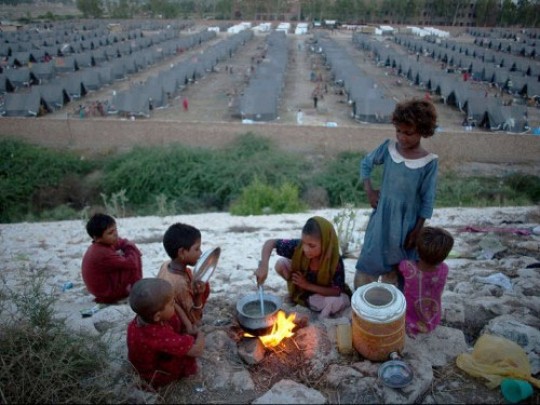Pakistan: UNICEF hands over 35 new schools in flood-affected Punjab
Pakistan: UNICEF hands over 35 new schools in flood-affected Punjab
 Children cook their daily meal in one of the 5,900 camps that sprung up across Pakistan in 2010 when the country was hit by the worst floods in its history.
Children cook their daily meal in one of the 5,900 camps that sprung up across Pakistan in 2010 when the country was hit by the worst floods in its history.
Thirty-five new schools constructed by the United Nations Children’s Fund (UNICEF) with donor funding in the southern area of Punjab province in Pakistan, which was devastated by floods in 2010, have opened with 4,500 pupils attending classes, the agency reported today.
The schools, which have been handed over to the Punjab Education Department, are in the districts of Muzaffargah, Rajanpur and Rahimyar Khan.
The embassy of the Netherlands in Pakistan contributed $1.2 million for the construction of 24 schools, while the Organization of Petroleum Exporting Countries (OPEC) donated an additional $250,000, which was used to build seven schools. Funding for the construction of four schools was provided by Italy, Hungary and Sweden.
The Child Friendly Schooling approach is interactive and makes learning fun for children.
UNICEF initiated a schools reconstruction programme in the worst affected districts of southern Punjab and other parts of the country since most of the Government school buildings were either damaged or completely destroyed.
The agency also established temporary learning centres to ensure that children did not miss their academic year. Prefabricated school structures with all amenities have replaced the temporary learning centres, UNICEF said in an update.
“The Child Friendly Schooling approach is interactive and makes learning fun for children,” said Karen Allen, UNICEF’s deputy representative in Pakistan.
“It has elements of health and hygiene through provision of safe drinking water and improved sanitation, early childhood and development for preparing young children for school, playground and equipment for healthy physical activities, psychosocial support for rehabilitation of trauma-affected children, involvement of parents and community, and many other unique features that makes education attractive.”
###
About United Nations Children’s Fund (UNICEF)

UNICEF works in 190 countries and territories to help children survive and thrive, from early childhood through adolescence. The world’s largest provider of vaccines for developing countries, UNICEF supports child health and nutrition, good water and sanitation, quality basic education for all boys and girls, and the protection of children from violence, exploitation, and AIDS. UNICEF is funded entirely by the voluntary contributions of individuals, businesses, foundations and governments. For more information about UNICEF and its work visit: www.unicef.org
###
> United Nations (UN).
 The United Nations was established on 24 October 1945 by 51 countries committed to preserving peace through international cooperation and collective security. Today, nearly every nation in the world belongs to the UN: membership totals 192 countries.
The United Nations was established on 24 October 1945 by 51 countries committed to preserving peace through international cooperation and collective security. Today, nearly every nation in the world belongs to the UN: membership totals 192 countries.
When States become Members of the United Nations, they agree to accept the obligations of the UN Charter, an international treaty that sets out basic principles of international relations. According to the Charter, the UN has four purposes:
- to maintain international peace and security;
- to develop friendly relations among nations;
- to cooperate in solving international problems and in promoting respect for human rights;
- and to be a centre for harmonizing the actions of nations.
###
* The above story is adapted from materials provided by United Nations (UN)
** More information at United Nations (UN)



















